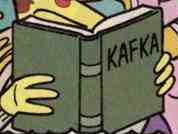
Difference between revisions of "Franz Kafka"
Solar Dragon (talk | contribs) (Well, it belongs under Behind the Laughter then and not in the opening section) |
Snowball II (talk | contribs) (except they use Kafkaesque within the episodes proper.) |
||
| Line 15: | Line 15: | ||
== History == | == History == | ||
| + | Due to vividly expressed anxiety, alienation, and powerlessness of the individual in his short stories, the term '''''Kafkaesque''''' is used as a description of both an illogical and nightmarishly complexity although Kafkaesque is criticized for being overused.<ref>{{Cite news|url=http://www.theguardian.com/books/booksblog/2016/may/18/kafkaesque-a-word-so-overused-it-has-lost-all-meaning|title=Kafkaesque: a word so overused it has lost all meaning?|author=The Guardian|date=May 18, 2016}}</ref> | ||
| + | |||
He is the namesake of [[Café Kafka]] in [[Springfield]].<ref>"[[Little Girl in the Big Ten]]"</ref> | He is the namesake of [[Café Kafka]] in [[Springfield]].<ref>"[[Little Girl in the Big Ten]]"</ref> | ||
Latest revision as of 07:03, February 19, 2024
Franz Kafka
| ||||||||
Character Information
|
Franz Kafka was a German-language surrealist writer from Prague.
History[edit]
Due to vividly expressed anxiety, alienation, and powerlessness of the individual in his short stories, the term Kafkaesque is used as a description of both an illogical and nightmarishly complexity although Kafkaesque is criticized for being overused.[1]
He is the namesake of Café Kafka in Springfield.[2]
Lisa loudly accuses Judge Snyder of being Kafkaesque in his ruling.[3]
Suspended teachers are not allowed to refer to the experience at the Teacher Holding Facility as either Kafkaesque or Orwellian.[4]
Non-canon[edit]

|
The contents of this article or section are considered to be non-canon and therefore may not have actually happened or existed. |
Sideshow Mel reads Kafka's works after he was fired.[5]
Behind the Laughter[edit]
Due to vividly expressed anxiety, alienation, and powerlessness of the individual in his short stories, the term Kafkaesque is used as a description of both an illogical and nightmarishly complexity although Kafkaesque is criticized for being overused.[6]
Appearances[edit]
 Episode – "Little Girl in the Big Ten" (Café Kafka)
Episode – "Little Girl in the Big Ten" (Café Kafka) Episode – "Orange Is the New Yellow" (mentioned)
Episode – "Orange Is the New Yellow" (mentioned) Episode – "The Ned-liest Catch" (referenced)
Episode – "The Ned-liest Catch" (referenced) Comic story – Metamorph Simpsons (referenced)
Comic story – Metamorph Simpsons (referenced) Comic story – All Fired Up (book cover)
Comic story – All Fired Up (book cover) Book – The Lisa Book (Kafka for Kids)
Book – The Lisa Book (Kafka for Kids)
References[edit]
- ↑ The Guardian. "Kafkaesque: a word so overused it has lost all meaning?".
- ↑ "Little Girl in the Big Ten"
- ↑ "Orange Is the New Yellow"
- ↑ "The Ned-liest Catch"
- ↑ All Fired Up
- ↑ The Guardian. "Kafkaesque: a word so overused it has lost all meaning?".
External links[edit]
| The Simpsons characters
| ||||||||||||||||||||||||||||||||||||||||||||||||||||||
|---|---|---|---|---|---|---|---|---|---|---|---|---|---|---|---|---|---|---|---|---|---|---|---|---|---|---|---|---|---|---|---|---|---|---|---|---|---|---|---|---|---|---|---|---|---|---|---|---|---|---|---|---|---|---|
| ||||||||||||||||||||||||||||||||||||||||||||||||||||||

